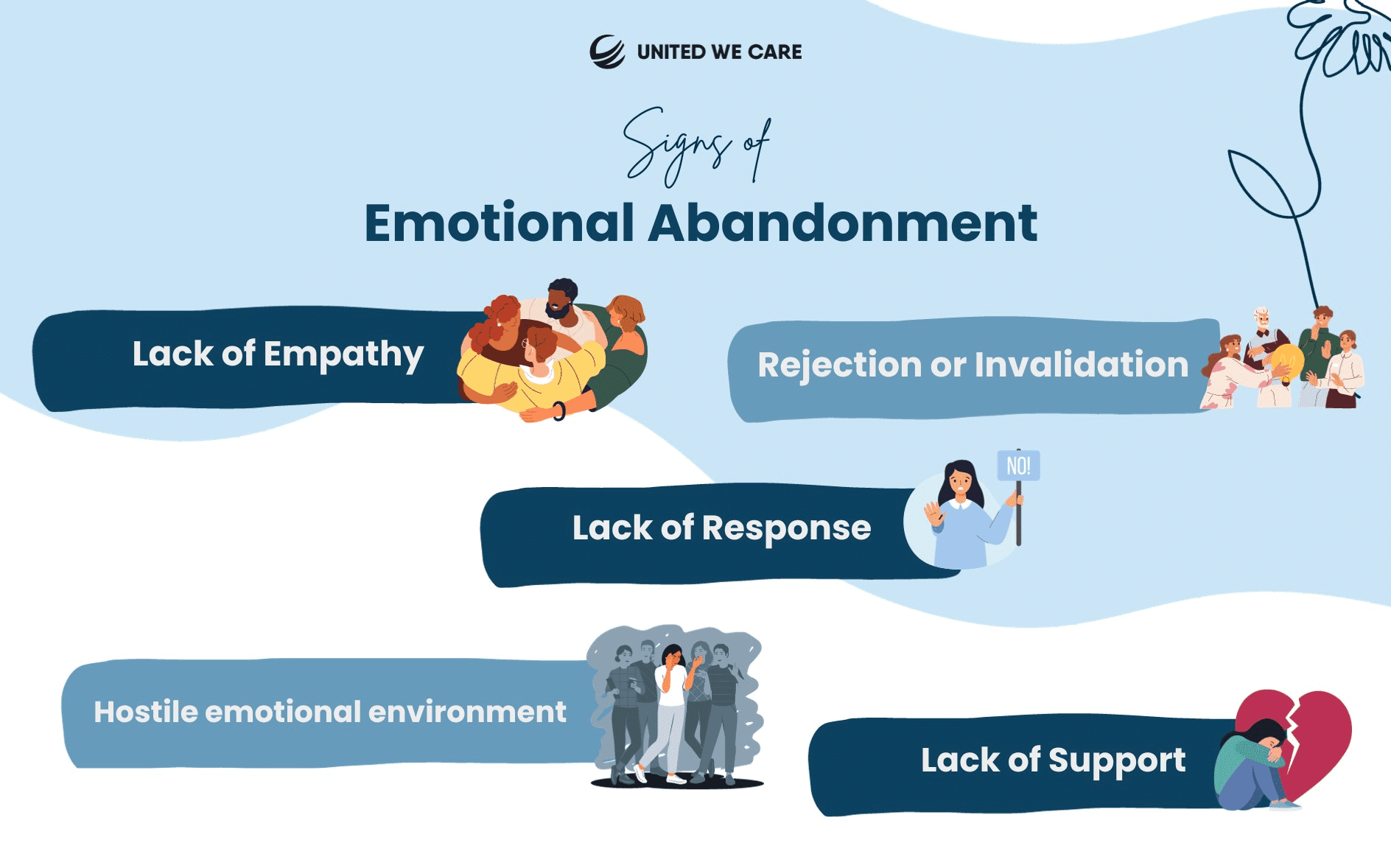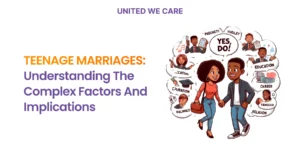Introduction
Remember Hilary Duff’s song “Stranger”? The famous line goes, “If they could only see you as I do, then they would see a stranger too.” It may have been a hit song, but speaking in terms of psychology, what the song really depicts is emotional abandonment. The partner is there, visible, and checks all the criteria for being perfect. Yet one major thing is missing: the emotional connection and intimacy with the singer. This can happen in any relationship, including the parent-child relationship. While all forms of emotional abandonment can have a negative impact on mental health, such neglect in childhood can have long-lasting impacts. This article will attempt to explain what emotional abandonment is and what it can do to a person.
What is Emotional Abandonment?
You had a bad day at work, and you go to your partner, seeking support and a safe space; instead, they listen only for a bit and start telling you how this is common, and you are overreacting. While it may not seem like much, what happened here was that your partner invalidated your emotions. One possible outcome could be that you might start feeling rejected or even shameful for having felt all those in the first place. If this response becomes a pattern, you will, over time, feel alone and as if they have abandoned you.
Emotional abandonment is a complex phenomenon that scholars usually talk about in the context of either romantic relationships or parent-child relationships. When parents (or partners) are constantly ignoring or not understanding the emotional needs of a child (or their partner), that child (or person) might be a victim of emotional abandonment [1]. Abandonment basically means you give up your responsibilities towards a person. When it is emotional, it usually looks like a refusal to provide affection, care, or emotional support to that individual [2]. This becomes more complex when the lack is only emotional, and the one abandoning actively provides for all the material needs of the person.
Emotional abandonment conveys to the person that they are unloved or unwanted or only loved when they fulfill the needs of the other and that their own needs do not matter. This is a very subtle form of abandonment, as unlike physical abuse or abandonment, it is not visible. Because of this invisibility, the person is more likely to blame themselves and actually believe that they are worthless or useless or “bad people” instead of identifying that someone hurt them [1] [2].
Must Read-How to know you are in a Healthy relationship
What are the Signs of Emotional Abandonment?

Emotional abandonment might be hard to understand or point out. However, usually, there is an absence of regard or support for the emotions of the person abandoned. Some signs that can reveal emotional abandonment are [1] [3] [4]:
- Rejection or Invalidation: One sign of abandonment is a disinterest in the emotions of the person. This can come as a direct rejection like “stop whining” or invalidation such as “you are overreacting.” The message conveyed is that your emotions and you are not important or not right, or you are the one to blame for all of this.
- Lack of Empathy: There is a lack of empathy as well. This is subtle because the person might be hearing you but at the same time not showing an understanding of what you are going through. They might also behave in difficult ways without regard to what happens to them.
- Lack of Support: Children need parents to teach them about emotions, the world, and emotional regulation. Adults, on the other hand, need support, advice, and a space to process their conflict. In situations of emotional abandonment, this support to process whatever is going on is absent.
- Lack of Response: There can also be a lack of enough or desired response to you. It is another form of rejection where the other hears or listens, or they might even see you in distress but take no action. For whatever reasons, they might not check in and offer help. They might ignore it and move on to some other thing.
- Hostile emotional environment: A number of times, emotional abandonment happens because the other person is inept in managing their own emotions, such as anger, pain, suffering, etc. They turn the entire environment hostile, and you feel like you are “walking on eggshells.” They may even project some of their emotions on you. This may not feel directly like abandonment, but you feel scared to share your emotions or about your needs.
Many times, when parents or partners are struggling with their own issues, they are unable to provide a psychologically safe environment. The result of this is emotional abandonment. At the same time, for adults, when talking about emotional abandonment, it is important to reflect on childhood and previous relationships. If you feel abandoned in almost all relationships and have a history of abandonment as well, chances are this has become a pattern for you, and it might not be due to the environment anymore.
Read more about- Anxious attachment
What are the Impacts of Emotional Abandonment on Mental Health?
There are a number of studies that have attempted to find the impacts of emotional abuse, neglect, and abandonment on a person. There is overwhelming evidence that in situations of emotional abandonment, especially in childhood, there are serious and long-term effects on the mental health of the person. These include [2] [5] [6]:
- Shame and Low Esteem: When parents are unable to cater to the needs of a child, the children end up feeling unwanted and worthless. Since we tend to trust our partners and caregivers, if they consistently invalidate us, shame and low self-esteem are the result. The abandoned child (or person) starts identifying with the aggressor and feels shame.
- Loneliness and Isolation: Emotional abandonment and abuse are closely related to feelings of loneliness and isolation. The feeling that “there is nobody to support or love me” becomes predominant, and many times, this means that the person does not trust other non-abandoning relationships as well.
- Depression and Anxiety: Emotional abuse and abandonment often lead to mental health issues like depression and anxiety. It can also cause suicidal ideations and contribute to feelings of being worthless or useless.
- Other Mental Health Issues: This form of abuse can also lead to mental health disorders like personality disorders, eating disorders, dissociative and even PTSD.
- Substance Abuse: Many children who are emotionally abandoned or abused end up coping with drugs and alcohol. Since they never learn how to manage emotions, they rely on substance to do so.
The impact of emotional abandonment is profound and often affects the overall quality of life of the person who has faced it. Whether it happens in childhood, whether it is a pattern, or whether it happens in adulthood, it is important to identify it and seek support or help.
More information about– Mental Health Neglect in Society
Conclusion
Emotional abandonment is difficult to identify, but more than that, it is difficult to bear. Sometimes, you do not know what is going on, and many times, you end up blaming yourself for all the issues. However, it is important to note patterns and identify whether this is a situation of emotional abandonment and abuse or not. If it is, or even if you have experienced a negative childhood, you can work on your symptoms and move towards a better life.
If you are someone who is struggling with emotional abandonment or its impacts, you can contact the experts at United We Care. At United We Care, our professionals are committed to providing you with the best solution for your overall well-being.
References
[1] J. Frankel, “Treating the sequelae of chronic childhood emotional abandonment,” Journal of Clinical Psychology, 2023. doi:10.1002/jclp.23490
[2] M. Marici, O. Clipa, R. Runcan, and L. Pîrghie, “Is rejection, parental abandonment or neglect a trigger for higher perceived shame and guilt in adolescents?,” Healthcare, vol. 11, no. 12, p. 1724, 2023. doi:10.3390/healthcare11121724
[3] J. Webb, “Ways emotional neglect can feel like abandonment to a child,” Dr. Jonice Webb | Your resource for relationship and emotional health., https://drjonicewebb.com/3-ways-emotional-neglect-can-feel-like-abandonment-to-a-child/ (accessed Sep. 26, 2023).
[4] J. Francisco, “Emotional neglect and abandonment of children,” Exploring your mind, https://exploringyourmind.com/emotional-neglect-and-abandonment-of-children/ (accessed Sep. 26, 2023).
[5] T. L. Taillieu, D. A. Brownridge, J. Sareen, and T. O. Afifi, “Childhood emotional maltreatment and mental disorders: Results from a nationally representative adult sample from the United States,” Child Abuse & Neglect, vol. 59, pp. 1–12, 2016. doi:10.1016/j.chiabu.2016.07.005
[6] R. E. Goldsmith and J. J. Freyd, “Awareness for emotional abuse,” Journal of Emotional Abuse, vol. 5, no. 1, pp. 95–123, 2005. doi:10.1300/j135v05n01_04










